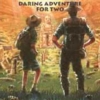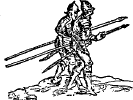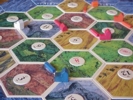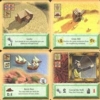NOTE: This page is frozen in time, circa 2002. I still like all the games I describe here, and stand by what I say, but my tastes have moved on to other things. Until I get around to updating this page somehow, please visit my own game blog.
My favorite board and card games
As I note on my general games page, I love all kinds of board and card games. This page lists my favorites as of right now. I'll modify it as my preferences change (and mark such changes on the updates page.)
Games with a publisher listed as "Icehouse" are actually rulesets for use with Looney Labs' Icehouse pieces. I link to the freely Web-readable versions of these rules (though Looney Labs does publish book-bound collections of the better games).
Current favorites
These are games which I can't get enough of. If you were to walk up to me right now and challenge me to any of these, I'd clear off the table with one sweep of my girly little arm and then growl let's go in a startling basso profundo.
Lost Cities (Rio Grande)

A game by Reiner Knizia, played with a five-suited card deck. My friend Carla correctly describes it as competitive solitaire. Two players alternate turns, drawing from a common deck and trying to build columns containing total values of 20 or more. Each column started has a "cost" of 20 points, so values over that amount score points, and columns that fail to reach that mark take points away.
Risk is present along two axes: first, a column can contain cards of only one suit, and you can play cards only in increasing order. So, if you play the yellow 6, that's 6 points for you, but if you later draw the yellow 4, there's 4 more potential points gone down the drain.
If you don't like cards, you can throw them into a discard pile -- but the game's other risk involves the fact that your opponent can pick them up, so you don't want to trash things that would become treasure to your competitor.
Battle Line (GMT)

Another Knizia game, this time with a six-suited deck. Like Lost Cities, it's all about building columns out of a shared draw pile, but instead of going for the biggest sums you must now try to build three-card "formations", akin to Poker hands, which range from a Wedge (a straight flush) to a Phalanx (three of a kind) to the lowly Host (no formation, just big numbers). For each of nine column-spaces, the player who can build a superior formation on his or her side wins that column, and winning either five columns or three contiguous columns brings victory.
The result is a game demanding a lot of observation, tactics, and calculated risk-taking. Despite its similar appearance, it differs from Lost Cities mainly in how you have to counter your opponent, since winning a column means guessing what they have up their sleeve, and then playing something just powerful enough to overcome it. Losing is expensive, since the cards you played into a lost column do you no good at all, no matter how impressive they were. This can make every move a delicious gut-wrencher.
Pikemen (Icehouse)

A very elegant chess-style game: there are three piece types on each side, and a single rule for moving and capturing them. A rich layer of strategies emerges from this, making for a truly elegant little board game. It plays well with 2, 3 or 4 players, but it may be most enjoyable with two.
Zendo (Icehouse)

Due to personal observation and experience, I feel that this game, designed by Kory Heath, is the killer Icehouse application; I have seen it introduce more people to the world of Icehouse gaming than any other title I can name. (This shouldn't be surprising, given its startling appearance: a good Zendo game involves long stretches of its players contemplating -- perhaps silently, perhaps with great vociferousness -- a tabletop covered with strange, colorful arrangements of plastic pyramids. This really does draw in the curious passers-by.)
One player, the "master", thinks of a secret rule -- called "Buddha Nature" -- for arranging a pattern of Icehouse pyramids (called a "koan"). It could be as simple as "A koan has the Buddha Nature if it contains any blue pyramids," or as complex as "A koan has the Buddha Nature if the sum of all its upright pyramids' pip counts is a prime number," The "students" then take turns following a simple ruleset of logical exploration, experimentation, and a bit of risk-taking as they seek enlightenment, trying to be the first the express Buddha Nature to the master's satisfaction.
The Settlers of Catan (Mayfair)

I include this on the list because I just bought a copy (finally, two years after moving into a gamer-filled town where Settlers is arguably the universal favorite) and I'm itching to play it. I think I've played it only once before, and I don't know how much I'll actually enjoy it once the novelty passes. We'll see.
"Settlers" (as it's usually called among its fans) has three or four players representing different civilizations racing to build the most impressive colony on the randomly-generated island of Catan. You gain points by building stuff, like cities, roads, and armies. Building requires spending the resources that you accumulate every turn through a combination of dice rolls and the position of your settlements on the island. All resources are scarce, and unevenly distributed among the players -- some will manage to get tons of bricks but no grain, and others will be rolling in ore but always poor of timber. Since you need a little of everything in order to grow, you must trade with your opponents to get what you need, without trying to help them out too much in the process.
RAMbots (Icehouse)
A clone of Richard Garfield's Robo-Rally, refactored to fit an Icehouse set and a chessboard. The players control programmable robots armed with a variety of lasers and tractor beams, and the winner is the first to tag all the colored beacons in his "goal stack".
It contains a lot of runtime chaos, all of the player-generated variety, rather than from pure chance. You deliver five movement and manipulation instructions at a time to your robots, but since everyone's instructions interleave as they execute, you can't depend on the board staying the same shape as your robot moves. Hence, a clever player will try to predict what all his opponents will do, and act accordingly -- while not being too obvious about it, lest his opponents pull the same trick on him. I like it a lot.
Old Standbys
The following list includes games that I've played and liked before, and maybe even own a copy of, though I don't pursue them with the same fervor I do with the above list's games. If you challenge me to one of these, there is a chance I will blow you off. God's own truth.
The Settlers of Catan Card Game (Mayfair)

Distinct from, but based upon, the famous board game Settlers of Catan, and by the same designer, Klaus Teuber. (Technically, it's more based on the expanded Cities and Knights of Catan game.) A two-player contest that does away with the board, instead starting off both players on equal footing, and has the players developing their principalities by linking cards together upon their own half of the table.
While land scarcity is simulated by a limited pool of settlement cards (the players can build only five new settlements between one another), resource variety is more evenly divided, so there tends to be far less trading than the Settlers board game forces. The card game makes up for it with raw pugilistics, filling the deck with lots of "screw-over" cards that let players steal or destroy their opponent's resources and buildings in various entertaining ways, with black knights, arsonists, brigands, and so on. To keep this from getting out of hand, these and other action cards permanently leave the game, once played.
A good game of Settlers:TCG can take an hour and a half, even with experienced players.
Carcassonne (Rio Grande)

The epitome of tile-laying (or map-building) games. Two to five players players take turns constructing a map of a medieval landscape, connecting roads, fields, and cities from the tiles they randomly draw. Points are scored through the shrewd placement of little wooden tokens (called either "guys" or "weebles" by my friends) on the map, which claim territories as your own. You only have a few of these, and must choose between no-risk "weasel points" to give you a quick boost, mid-term investments to gain points in modest chunks, or long-term risks that will limit your play options but will pay off big in the end, if you can defend your turf, or steal it away from other players.
In my view, this game represents a fine balance of strategy and cunning with randomness and luck. I love that.
Ice Towers (Icehouse)
A simple, turnless game of strategically stacking Icehouse pieces. Besides being lighthearted and fast, the game really brings out the aesthetic quality of the little plastic pyramids, in both the tactile and aural senses, as you hurriedly stack and reorder them with pleasant clink-clink sounds. The Looneys wisely bill the game as an introduction to the world of Icehouse games (but see my description of Zendo).
Bohnanza (a.k.a. "The Bean Game") (Rio Grande)

A trading game where the players are all bean farmers, trying to get richest quickest. Optimally, you'll make trades that bring you cash while not helping your opponents too much. I don't play it very well because I'm too shrewd for my own good and otherwise not big on diplomacy (see also Icehouse), but I like the constant communication it requires -- which also provides an opening for silly bean-farmer role-playing, if you feel up to it. Unfortunately, I usually do.
Nearly everyone I know calls this one "The Bean Game" because, really, "Bohnanza" is a crappy name. It makes a nice pun in the original German, where Bohn means "bean". So why isn't the English translation called "Beananza"? Legal reasons? Who knows.
Pit of Regret
These are good games, and lots of my friends like them, but I don't, for one reason or another. It will take some convincing to get me to play these games at all. I reserve the right to promote these games into the upper two lists should I ever rediscover them; it's happened before.
Icehouse (Icehouse)
The first Icehouse game I played was... Icehouse, the game for which the eponymous pieces were originally designed. Stumbling across a description of custom Icehouse pieces on Zarf's website some years ago served as my introduction to both Looney gaming and the whole alt.gaming scene (to steal friend Joe's name for it). After I bought a set of paper pieces (the only kind that the Looneys sold in those pre-plastic-pyramid days), my coworkers and I made an almost daily habit out of playing it when we went out to lunch.
This changed when we bought our first sets of plastic pieces. Looney Labs sells icehouse pieces in one-color, fiteen-piece "stashes" now, but initially sold them as "The Martian Chess Set", a box containing four colors (60 pieces) and little rulebooks for four games: Martian Chess, Ice Towers, Ice Traders, and Zarcana. My local friends and I quickly grew especially fond of these, and then started to explore the other Icehouse games available online. We never played the original Icehouse game again.
Inevitably, and especially since Looney Labs' Playing with Pyramids book "rereleased" Icehouse as a game unto itself once again, I had started to experiment with it once more. Oh, I should have stopped there, but... I attended the 2002 Origins game expo with three local friends, and on Julia's encouragement, entered the 13th International Icehouse Tournament with her and Denis, Just Because We Could, and certainly not because any of us had any particular Icehouse skill.
I was, in a word, unprepared for my exposure to the game as it's really played, by those who have been playing it a long time. (And those who designed it in the first place, who were among the tournament players.) I had thought the game was just a contest of tactical piece-placement with room for diplomacy; that's how I had played it with all my friends. Oh, no no no. It is actually all about diplomacy, carried out through piece placement. Every important move seemed to be a team effort, with opponents forming brief alliances (very brief, since games have a 10-minute timer) to disrupt other opponents' defensive formations and swap captured "prisoner" pieces, shuffling them around the table to foil attackers in ways that made my head spin. It was an entirely different game than the Icehouse I knew anything about.
I didn't try to learn how to play correctly in the space of the tournament. I played the way I normally did, silently and solitarily, and declining other players' offers to help with this or that, not so much out of intentional unilateralism as from my ignorance of these advanced strategies and protocols. In every game I ended up collecting few points and some seriously dirty looks from various Icehouse masters, since I managed to mess up everyone else's strategies through my apparent stubbornness. Without realizing it, I had made myself the worst kind of Icehouse player. I was... uncool.
In light of this sudden definition, I can't really enjoy the original Icehouse game anymore. Diplomacy really isn't my strong suit in any game, and probably not in real life, either. And yet, this doesn't make me sad, because the Icehouse gaming universe is really big (note that several of the entries on this page are other Icehouse games), and it's really just getting started, since the pieces have been widely available only since 1999. Carry on.
Boggle (Parker Bros.)
Boggle gets a mention here not because it's ever frustrated me on any level, but because it's a local phenomenon that I've never quite been able to get into. Many are the locals who are so ga-ga about Boggle that they play it every day at work, and fantasize about being professional Boggle players some day. They give one another various editions of Boggle sets for holiday and birthday gifts. Shake a Boggle board in their vicinity, and they come running like cats to a can opener. (This is all normal and healthy gamer behavior, mind you. It's just a particular incarnation I haven't seen elsewhere. And really, that makes it more beautiful.)
You know what Boggle is, right? Take 16 or 25 dice with a letter on each face, shake them randomly into a square grid, over goes the egg timer and then everyone races to find words made of contiguous letters (not necessarily -- in fact, rarely -- in a straight line), with longer words worth more points. A twist comes from the fact that you score only for words that you alone find; if a word is so obvious that two or more players found it, nobody gets its points. Typically, most of the words on every players' lists get filtered out this way. That's actually pretty interesting, as far as these things go.
I have tried to get into my friends' spontaneous Bogglothons, but around game 3 or 4 I've had enough, while everyone else is just warming up. Really, I'm not all that good with word games, or at least with word games involving a time element. I'm better with things like Scrabble and Quiddler, where the worst people can do is yell at me to hurry up and go (and everyone I play games with is used to doing that anyway).
On an abstract level, I take issue with all word games, since playing them well means knowing a language (or at least its vocabulary) really well, and this joining just seems irkishly inelegant to me. I can master the mechanics of Scrabble, for example, but if I don't know about a certain high-scoring word, then no amount of practice is going to let me discover and use it until I happen across the word outside of the game, or through an opponent with a better vocabulary. This lack of self-containedness bugs me.
Granted, Boggle's a little different here, too. To play Boggle really well, you need an affinity for English word construction, so that your eye can see a clumps of likely letter combinations, and then scan for nearby letters in order to lexify them. I can understand the attraction, and I suppose that, really, I just wish I were better at it. :)
Gnostica (Icehouse)
A wargame played on a semirandom and everchanging board of Tarot cards, Gnostica is a game I really want to like. I want to like it so much that I continue to insist on trying it, just one more time, at least every few months or so. The game seems beautiful to me in every respect except one, just one little rule: to win the game, you have to collect a certain number of points (by occupying a sufficient number of card-territories) and then challenge the other players to unseat you. If they can't reduce your score below the winning threshhold in one go-round, the day is yours; else, you lose, and must gather up all your pieces and go pound sand. The surviving players continue until someone makes a similar power-play and succeeds, or until only one player remains.
I hate this. I don't want to hate it, and I don't hate it on principle. But: when it happens to me, I always feel frustrated and sulky. Taking a risk is one thing, but when the ability to continue having fun is at stake, the game is broken; the fun of a game should never go away, no matter what happens to you. Yes, it's a personal issue; clearly the people who like this game don't let this style of losing kill their fun. It kills my fun, though. Kills it right dead, and replaces it with the opposite of fun, because it's not like I've simply ended up with someone else winning, as with most other games -- I have failed to win, on a level that feels much deeper. And so, I must powerbarf upon this rule, and by extension the whole game to which it is attached. And yet, I want to like it. You see my problem.
For the record, Gnostica is the "sequel" to Zarcana, a game with a similar setup but with luck playing a much greater role, as the trump (major arcana) cards all have wildly different (and rather uneven) powers and point values. (Almost all of Gnostica's trumps simply give you some combination of two suit-powers, or let you alter your turn order.) It lacks the win-or-fuck-off rule. Zarcana's rules were among those included with the Martian Chess Set, so several friends and I got to play and enjoy it many many times before Gnostica came out. Now Zarcana is no longer an officially "supported" Icehouse title, and playing it today carries the weight of guilt that you're doing something obsolete and retroactive.
Yes, I have issues. It's all good. Let's just play Pikemen or something.
 jmac@jmac.org
jmac@jmac.org @jmac@masto.nyc
@jmac@masto.nyc